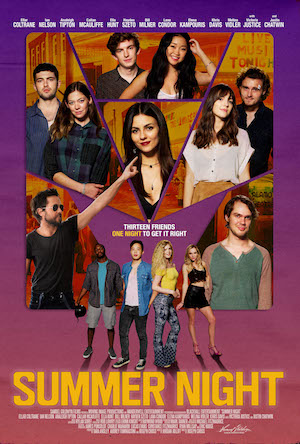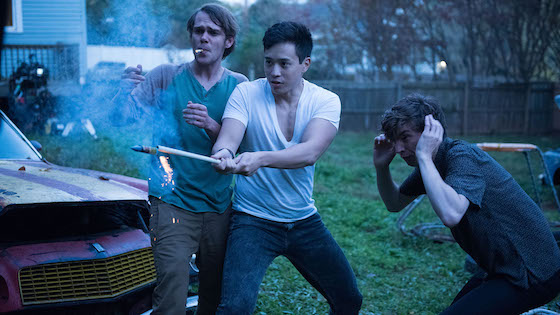
[Rating: Minor Rock Fist Down]

A movie about listless, uninspired, confused man-children and the throngs of women tying themselves in knots over them, Summer Night isn’t bad so much as it is boring. Set over the course of about one day/night, the film rotates through a roster of badly drawn, half-baked characters who elicit little sympathy and even less interest. The end result is a movie that most have seen about a dozen times before, stocked with recycled themes and character arcs that would feel tired in a 90s sitcom.
Set in the southern U.S., Summer Night opens with friends Jameson (Ellar Coltrane) and Seth (Ian Nelson) coming back into town after a hike/swim, where the latter is greeted by a slew of texts from his girlfriend, Mel (Analeigh Tipton). Mel is pregnant, and Seth seems to have no concept of how to handle the situation (or even that such a thing is possible). The movie then jumps to a new character, Taylor (Callan McAuliffe), an aloof but kind-hearted musician who gets mugged by a pair of hillbillies on a bicycle trail. Summer Night then introduces yet another person, Rabbit (Bill Milner), who is reeling from the news that his lady friend, Lexi (Lana Condor), hooked up with another guy. The movie also takes a break from these characters to introduce Lexi and Mel, who only exist in this movie to talk about boys, yet by this point it’s hard to care.

The stakes for all of this are so low, and the “problems” so ordinary, that it’s difficult to develop any investment with these people, who are shallow at best and desperately ordinary at worst. It’s not that a movie about the everyday drama of young 20-somethings can’t be interesting, but for that to happen, there has to be some new or interesting hook for them. An unexpected pregnancy is a big deal, sure, but it is something that has been portrayed in T.V. and film countless times by characters who offer far more buy-in than these people. Summer Night doesn’t have this, however, and instead just assumes the audience will care about the baby drama by default, bypassing any real development of Seth or Mel beyond their predicament.
Instead of this development, the script shifts its attention to Jameson’s dilemma about whether he should hook up with a gorgeous part-time model who really digs him, or the beautiful ex-girlfriend that is still pining over him. This thread is itself interrupted by Taylor’s sub-plot, which is also about two stunningly beautiful women who are fighting for his attention. (If this film was taking a physical copy of the Bechdel Test, it wouldn’t just fail: the paper and pencil would explode and the classroom would burn to the ground).
And it’s not just the thin plot and one-note characters that are an issue, here. Dialogue-wise, this feels like a script written via predictive text using conversation takeaways from bad 1980s credit card commercials. The actors do their best with it, but it often comes across like folks reading their lines during a first day of production table read. People have conversations that don’t push the plot forward, which isn’t necessarily a bad thing, but these aren’t world-building or character-enhancing chats, but rather filler for scenes that have little connective tissue aside from the shared characters and location (a bar music venue).

This movie wants to be Dazed and Confused, American Graffiti, or Go, but those “it happened one night” plot structures invested in a core group of unique characters and put them in a position to succeed within that narrative. In Summer Night, whenever the movie starts to draw out a character and establish some kind of base for them within the story, it shifts to another person, who is as ill-defined and shallow as the last. There’s no balance of character and conflict, here, and the one big plot it invests in (the pregnancy) is so listless and unsympathetic vis a vis the characters involved that it drags everything else down.
Summer Night is well shot, and looks great, but as the film moves through its second act, it feels less like a story and more of a backdrop for the musical performances peppered throughout the thing. And really, that’s what this whole thing feels like: an extended music video. Like the rest of the film, these moments when Summer Night stops dead in its tracks to enjoy a song look great, and sound even better, yet for a 90-minute movie juggling a dozen different leads, it amounts to little more than a distraction. Director Joseph Cross (so wonderful in front of the camera in Spielberg’s Lincoln) has a good eye for shot framing, and makes his actors look wonderful, but there’s little he can do for the script.
And really, that’s too bad. Inconsequential, shallow, boring, and/or unsympathetic characters stuck in a script with nothing new to say (and possessed of nothing novel in the way to says it) ultimately sinks Summer Night. Buoyed by good music and great camera work/direction, the film isn’t a total misfire, but it struggles to provide an excuse for its own existence with every passing minute of its run-time.





Comments on this entry are closed.